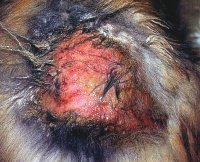
WHAT IS ECZEMA ? First broadcast on www.provet.co.uk |
This information is provided by Provet for educational purposes only.
You should seek the advice of your veterinarian if your pet is ill as only he or she can correctly advise on the diagnosis and recommend the treatment that is most appropriate for your pet.
Eczema is a term in general use - but it is not a specific disease, and it is a term that is easily misunderstood because it can be applied to almost any skin disease.
The formal definition of "eczema" is skin inflammation with lesions that :
- scale- scale (scurf or dandruff) is an accumulation of dead and shed cells from the outer layer (epidermis) of the skin.
- crust - crust is a mixture of cells with dried blood or serum
- ooze a serous fluid - this is seen as a wet area of skin
- often accompanied by intense itching (also called pruritus)
The signs of itching, scaling, crusting and fluid seepage are all secondary to an underlying (primary) cause.

An example of acute moist dermatitis (one form of "eczema") which is a localised lesion caused by self-trauma. There are many primary causes of this.
Once an animal starts scratching the surface of the skin is damaged by the self-trauma and can ooze or develop crusting, so a vicious cycle is set up. In the end the damage to the skin can be more serious than the initial cause of the irritation. There are many different primary causes of "eczema" (ie underlying problems which lead to the development of the above signs) including :
- Bacterial infections
- Immune diseases
- Flea allergy (hypersensitivity)
- Atopic or contact dermatitis (allergy to environmental factors)
- Parasites eg sarcoptic mange (causes intense irritation and self-trauma), cheyletiella (cause excessive scale)
- Traumatic dermatitis (localised self-trauma)
- Metabolic diseases
- Seborrhoea
- Feline acne
It is obvious from this short list that identifying the primary cause of eczema can be a clinical challenge. In first opinion veterinary practice, unless the primary cause is easy to identify (such as a reaction to fleas), treatment is aimed at reducing the clinical signs. If the patient fails to respond to initial treatment more detailed investigative tests have to be performed to try to identify the underlying cause, and sometimes referral to a specialist in veterinary dermatology is necessary. Unfortunately, the underlying cause for some forms of "eczema" can be difficult or even impossible to determine - so the animal may need long term medical treatment to keep the signs under control.
Updated October 2013